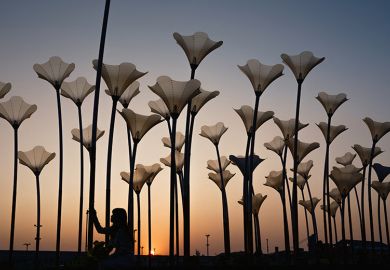Browse the full results of the Arab University Rankings 2021
Universities in Saudi Arabia lead a new Times Higher Education ranking focused on the Arab region.
King Abdulaziz University tops the inaugural THE Arab University Rankings, while four other institutions in the county also feature in the top 10: King Abdullah University of Science and Technology (KAUST) (third), Prince Mohammad Bin Fahd University (fourth), King Fahd University of Petroleum and Minerals (fifth) and King Saud University (eighth).
Overall, 22 Saudi Arabian universities are ranked in the list. On average, the country performs particularly well on metrics relating to the share of international staff, international co-authorship and institutional income.
The United Arab Emirates is the only other nation with more than one institution in the top 10; Khalifa University and United Arab Emirates University are sixth and seventh respectively, with both institutions receiving high scores for metrics relating to the research environment.
Qatar has only one representative in the table – the flagship Qatar University – but it claims second place thanks to strong scores across the board.
Meanwhile, Egypt is the most-represented nation, with 31 institutions, led by Zewail City of Science and Technology in 10th place. Five other Egyptian universities feature in the top 20. The country receives a strong average score for citation impact and teaching reputation, the latter of which is based on the first THE survey exclusively dedicated to published academics in the Arab region. Egypt is also home to the most leading large universities in the region; there are 20 ranked institutions with more than 50,000 students and all of the top 10 are in the North African country.
Lebanon is the only other country to feature in the top 10, with the American University of Beirut claiming ninth place.
Arab University Rankings 2021: top 10
| Rank 2021 | Position in World University Rankings 2021 | Institution | Country |
| 1 | 201–250 | King Abdulaziz University | Saudi Arabia |
| 2 | 301–350 | Qatar University | Qatar |
| 3 | NR | King Abdullah University of Science and Technology (KAUST) | Saudi Arabia |
| 4 | NR | Prince Mohammad Bin Fahd University | Saudi Arabia |
| 5 | 501–600 | King Fahd University of Petroleum and Minerals | Saudi Arabia |
| 6 | 351–400 | Khalifa University | United Arab Emirates |
| 7 | 301–350 | United Arab Emirates University | United Arab Emirates |
| 8 | 401–500 | King Saud University | Saudi Arabia |
| 9 | 301–350 | American University of Beirut | Lebanon |
| 10 | NR | Zewail City of Science and Technology | Egypt |
NR = not ranked
Overall, 125 institutions from 14 countries are ranked in the inaugural Arab University Rankings, with the vast majority (100) being public institutions. A further 30 institutions are listed with “reporter” status, meaning that they provided data but did not meet our eligibility criteria to receive a rank. The top-ranked private university is Saudi Arabia’s Prince Mohammad Bin Fahd University in fourth place.
The ranking is THE’s most comprehensive assessment of higher education in the Arab region to date. Fifty-five of the ranked institutions, including Bahrain and Palestine’s two representatives each, did not feature in the latest World University Rankings due to its stricter eligibility criteria. Iraq is the third most-represented nation in the Arab ranking, with 16 ranked institutions (and a further 15 with reporter status), but only two of these were included in the global table.
The methodology behind the Arab ranking is based on the same framework as the global table, but some adjustments have been made and some new metrics have been included to reflect the features and missions of universities in the Arab region. There are regional measures on reputation and collaboration as well as metrics related to social impact.
Nasser Al-Aqeeli, Saudi Arabia’s deputy minister for research and innovation, said that the country’s strong performance in the ranking was partly driven by recent policies to strengthen research and innovation in universities.
The Ministry of Education has worked with a number of public and private sectors to establish 12 national research and innovation priority areas “to help universities focus their research on what is needed in Saudi Arabia”, Professor Al-Aqeeli said. It has also worked directly with institutions on their own research strategies based on their strengths and what is needed in their local cities and regions.
Meanwhile, last year the ministry initiated a new national funding system for universities. The “institutional fund program” gives a pot of research funding to each university and the university administration manages how this is distributed to its academics, instead of scholars submitting grant proposals to the ministry, to help speed up the process. As a result, Saudi Arabia was ranked first in the Arab world and 14th globally for the number of coronavirus-related research publications, Professor Al-Aqeeli said.
Habib Fardoun, director of the Observatory Center for Academic Standards and Excellence at King Abdulaziz University, said that the institution's research projects are all done in collaboration with international, regional and national partners to acheive the strongest results, while over the last 10 years the university has worked on improving the quality of its education.
On the Arab ranking more broadly, Dr Fardoun said the methodology is “aligned with the Arab countries’ strategies”, which will enable governments to measure the outputs of their universities and to give institutions more support in shaping and fulfilling these strategies.
Phil Baty, chief knowledge officer at THE, said that universities in the Arab world have achieved “very strong progress” in recent years in the World University Rankings but “the increased presence of Arabic institutions in the global ranking does not do full justice to the rich diversity of the sector, and does not fully reflect the range of activities and missions at the regional level, or the priorities of more regionally focused institutions”.
“So it is very exciting that this new, bespoke ranking for the Arab region allows us to offer a more nuanced, regional context, allowing many more institutions in the region to benchmark themselves against a range of relevant performance indicators and deploy THE’s trusted data to support their missions and their development,” he said.
Countries represented in the Arab University Rankings 2021
| Country | Number of institutions | Top institution | Rank |
| Egypt | 31 | Zewail City of Science and Technology | 10 |
| Saudi Arabia | 22 | King Abdulaziz University | 1 |
| Iraq | 16 | University of Baghdad | 51–60 |
| University of Technology, Iraq | 51–60 | ||
| Algeria | 14 | University of Abou Bekr Belkaïd Tlemcen | 91–100 |
| University of Béjaïa | 91–100 | ||
| Ferhat Abbas Sétif University 1 | 91–100 | ||
| Université Frères Mentouri Constantine 1 | 91–100 | ||
| Jordan | 8 | The University of Jordan | 22 |
| United Arab Emirates | 7 | Khalifa University | 6 |
| Lebanon | 7 | American University of Beirut | 9 |
| Tunisia | 6 | University of Tunis El Manar | 39 |
| Morocco | 6 | University of Marrakech Cadi Ayyad | 41 |
| Bahrain | 2 | Arabian Gulf University | 15 |
| Kuwait | 2 | American University of the Middle East | =24 |
| Palestine | 2 | An-Najah National University | 51–60 |
| Qatar | 1 | Qatar University | 2 |
| Oman | 1 | Sultan Qaboos University | 16 |
Register to continue
Why register?
- Registration is free and only takes a moment
- Once registered, you can read 3 articles a month
- Sign up for our newsletter
Subscribe
Or subscribe for unlimited access to:
- Unlimited access to news, views, insights & reviews
- Digital editions
- Digital access to THE’s university and college rankings analysis
Already registered or a current subscriber?








